29 Aug2023
By Penn GSE News
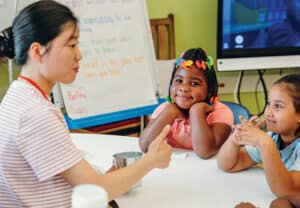
A member of a classroom team works with a group of students in the summer program at Henry C. Lea Elementary in West Philadelphia. The format of the Netter Center and Penn GSE collaboration was transformed this year to better individualize it for students. (Photos by Joe McFetridge)
This article was originally published by Penn GSE News.
For the last six weeks, Henry C. Lea Elementary in West Philadelphia has been humming with excitement and energy as students joyfully engage with interesting, colorful educational content. The activity is part of a joint pilot led by the Barbara and Edward Netter Center for Community Partnerships and Penn GSE, which has kids from kindergarten to third grade engrossed, immersed, and learning.
“The last two years [gave] us a lot of information about what works and what doesn’t. Really listening to the teachers and being creative about how instructional teams could be built for closer support of kids were really at the heart of this new model,” said Caroline Watts, a senior lecturer, and director of Penn GSE’s Office of School and Community Engagement (OSCE).
Although this is the third summer of the Netter Center and Penn GSE collaboration, the program is being considered a pilot. That’s because this year, the learning model was radically altered. Instead of 45-minute blocks modeled to be like regular classes, students now cycle through stations within the classroom and work through smaller, more gamified tasks.
28 Aug2023
By Debbie K. Mercer
In March 2023, AACTE awarded the 2024 Best Practice Award for the Innovative Use of Technology to Kansas State University. In this article, Debbie Mercer, dean, provides a summary of the university’s award-winning body of work.
AACTE is currently accepting nominations for the 2024 Best Practice Award for the Innovative Use of Technology The deadline is September 1. Learn more and submit an entry.
Kansas State University’s College of Education (COE) has developed a significant body of work leveraging technologies for innovative remote learning opportunities. Through the use of telepresence robots in conjunction with more conventional remote communications platforms, the COE has developed an integrated body of teaching, research, and service activities that engage teacher education candidates, teachers, faculty, and students in bold new initiatives that build a vision for 21st-century learning and engagement on the traditional strengths of the institution. From remote field experiences that bring teacher education candidates to high-need rural schools, to international service-learning opportunities, to fully remote teaching internships, these initiatives are both sustainable and scalable.
28 Aug2023
By Nicole Dunn
As faculty return to campus to prepare for the year, we know a major part of that is planning robust classroom observation experiences for candidates. ATLAS (Accomplished Teaching, Learning and Schools®) is a video library that provides video cases and analysis tools of accomplished teaching practices indexed to common teaching and learning frameworks across various classroom settings. Observations with ATLAS are made even more valuable because they include insights into behind-the-scenes instructional decision-making.
Having worked with NBTPS to elevate ATLAS as a tool during the pandemic and seeing how member institutions like Eastern Michigan University and Kansas State University continue to integrate the platform to enhance their programs, AACTE is excited to offer a discount for this tool through the end of the year. AACTE has partnered with the National Board of Professional Teaching Standards, Inc. (‘NBPTS’ or ‘The National Board’) to offer individual and institutional access to ATLAS at a reduced cost for AACTE members who are new subscribers.
22 Aug2023
By Kaitlyn Brennan
The “In the States” feature by Kaitlyn Brennan is a weekly update to keep members informed on state-level activities impacting the education and educator preparation community.
As the school year begins, teacher vacancies across the state of Florida are a top concern; yet the Florida Department of Education and the Florida Education Association are at odds over whose data is more reflective of the reality. In a press release issued by Florida’s Department of Education (FDOE) last week, the state’s Commissioner of Education, Manny Diaz, touted a near 10% decrease in teacher vacancy slots at the beginning of the new school year versus one year ago. As reported by FDOE, the state currently has roughly 4,776 open teaching positions — an 8% decrease in the number of teacher vacancies reported at the same time last school year. But Florida’s Education Association (FEA), the state’s largest teacher’s union, says that those numbers simply are not accurate. Last week, the FEA reported that nearly 7,000 teaching positions remained vacant at the beginning of the school year. In a statement, a representative from the FEA said:
“Now is not the time to sugarcoat or downplay the teacher and staff shortage. It’s bad, and kids are losing out. The Florida Department of Education can do its best to minimize the staffing crisis facing Florida’s public schools, but the truth is in the numbers. We stand by FEA’s August 7 count of vacancies listed on school districts’ websites, just as we stand by the counts we have conducted over the past several years. Due to low pay and a divisive political climate of fear and intimidation, the teacher, and staff shortage has gone from bad to worse under the DeSantis administration.”
The Florida teacher vacancy numbers from both the FDOE and FEA do not include the number of teachers across the state who are underqualified.
22 Aug2023
Submit Your Entry in the 2024 AACTE Awards Program by Sept. 1
By Brooke Evans
 It’s awards season at AACTE, and all AACTE members are invited to submit entries. The AACTE Awards Program recognizes both member institutions and individuals who have made significant contributions to the field of educator preparation. In identifying notable programs, practices, activities, writing, and research, these awards encourage all member institutions to strengthen the profession of teacher preparation through innovation, high standards, and leadership.
It’s awards season at AACTE, and all AACTE members are invited to submit entries. The AACTE Awards Program recognizes both member institutions and individuals who have made significant contributions to the field of educator preparation. In identifying notable programs, practices, activities, writing, and research, these awards encourage all member institutions to strengthen the profession of teacher preparation through innovation, high standards, and leadership.
Global education advocates are encouraged to apply at aacte.org for the following awards by September 1:
22 Aug2023
By Hiller A. Spires and Shea Kerkhoff
This blog article is part of the Global Education Faculty PLC Professional Development Series, sponsored by the Longview Foundation. The writing series aims to elevate the perspectives of international scholars, including teacher educators, graduate students, and alike, to offer insights into how educator preparation programs (EPPs) can integrate intercultural understanding within their programs. AACTE members interested in participating in the series should contact Brooke Evans at bevans@aacte.org.
Note: The AACTE Call for Awards is open for the 2024 Best Practice Award in Support of Global and International Perspectives, which recognizes exemplary practice in the intercultural, global, cross-cultural, and international arenas, and the 2024 Best Practice Award in Support of Multicultural Education and Diversity that recognizes the infusion of diversity throughout all components of a school, college, or department of education (SCDE) as critical to quality educator preparation and professional development. If you wish to apply for one of these awards, please visit aacte.org. Applications must be received by September 1, 2023.
In response to a continuously changing and connected world, our new book published by Routledge, Critical Perspectives on Global Literacies: Bridging Research and Practice, explores research, theory and practice in the field of global literacies. We synthesized current research to derive our four-dimensional definition of global literacies, which we argue are literacies needed to learn and communicate in, about, with, and for an interdependent world, including:
- Literacy as a human right in all nations around the world
- Critical reading and creation of multimodal texts about global issues
- Intercultural communication with globally diverse others; and
- Transformative action for positive change that traverses borders.
22 Aug2023
By Amanda K. Belue
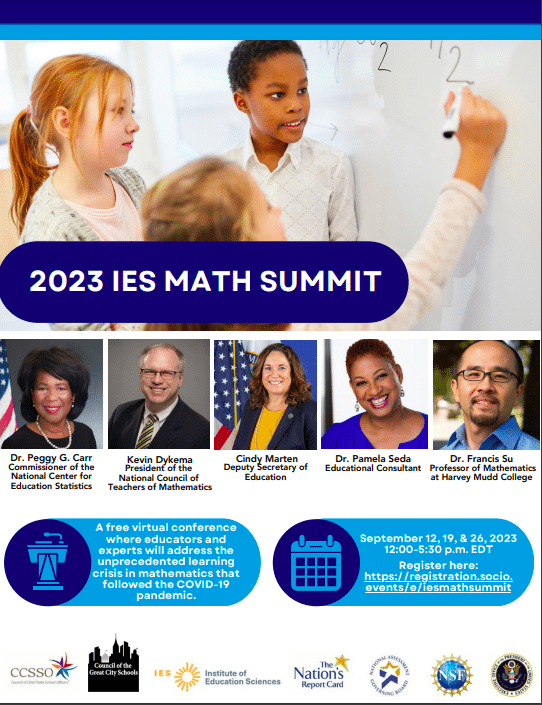 In October 2022, the Nation’s Report Card revealed that fourth- and eighth-grade students assessed in the 2021-22 school year experienced the largest declines in mathematics performance in the program’s history. These national declines in achievement on the National Assessment of Educational Progress (NAEP) highlight the unprecedented learning crisis that has followed the COVID-19 pandemic. Even before the pandemic, gaps in the mathematics achievement of students with the highest and lowest performance were already widening.
In October 2022, the Nation’s Report Card revealed that fourth- and eighth-grade students assessed in the 2021-22 school year experienced the largest declines in mathematics performance in the program’s history. These national declines in achievement on the National Assessment of Educational Progress (NAEP) highlight the unprecedented learning crisis that has followed the COVID-19 pandemic. Even before the pandemic, gaps in the mathematics achievement of students with the highest and lowest performance were already widening.
On the afternoons of September 12, 19, and 26, 2023, national, state, and local leaders — along with educators, researchers, policymakers, and instructional experts — will convene to explore efforts to address this crisis. The three-day summit will be led by the U.S. Department of Education’s National Center for Education Statistics (NCES) and the Institute of Education Sciences (IES). The Council of Chief State School Officers (CCSSO); the Council of the Great City Schools (CGCS); the National Assessment Governing Board (NAGB); the National Science Foundation (NSF); and the White House Office of Science and Technology Policy have contributed to the design and planning for the Summit.
22 Aug2023
By Aaron Burgin

Virginia Loh-Hagan is involved in the Asian American Education Project, which offers resources to teach and learn often overlooked history of Asian Americans. (Aaron Burgin/SDSU)
This article was originally published by the San Diego State University News Center.
On campus, Virginia Loh-Hagan is known as an educator and an advocate who impacts scores of students as director of SDSU’s Asian Pacific Islander and Desi-American (APIDA) Center.
Beyond the walls of San Diego State, Loh-Hagan’s combined passions for education and Asian American advocacy could impact millions of America’s youngest learners.
She is the co-executive director and curriculum director of The Asian American Education Project (AAEdu), which creates and provides curriculum and professional development for K-12 schools — offering a more comprehensive and accurate look at APIDA history.
22 Aug2023
By Nicole Dunn

Last month, AACTE announced its new partnership with the Early Childhood Intervention Personnel Center on Equity (ECIPC-E), a national center federally funded by the U.S. Department of Education’s Office of Special Education Programs to assist states in building comprehensive systems of personnel development to improve outcomes for infants and young children with disabilities and their families.
As part of this partnership, AACTE will recruit, mentor, and support a cohort of 12 Holmes scholars in early childhood special education doctoral degree programs.
22 Aug2023
By Shannon G. Magsam
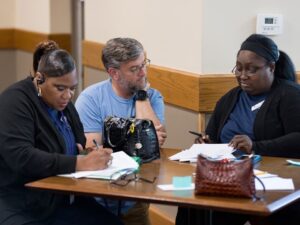
David D. Christian, associate professor of counselor education and supervision in the College of Education and Health Professions, works with two Arkansas Teacher Corps fellows.
This article was originally published by the University of Arkansas.
An interdisciplinary faculty team has developed a wellness program for Arkansas Teacher Corps fellows with funds from a College of Education and Health Professions WE CARE grant.
WE CARE, an acronym for Wellness and Education Commitment to Arkansas Excellence, advances three priorities centered on expanding impactful research, engaging in service to Arkansas, and fostering a caring culture.
Arkansas Teacher Corps is a partnership between the College of Education and Health Professions, the Walton Family Foundation, the Arkansas Department of Education, and participating Arkansas public school districts to recruit, train, license , and support teachers across the state. The Arkansas Teacher Corps provides an accelerated path to teaching at a time when many Arkansas schools face severe teacher shortages.
15 Aug2023
Sets the Stage for Educator Workforce Policy and Practice
By AACTE
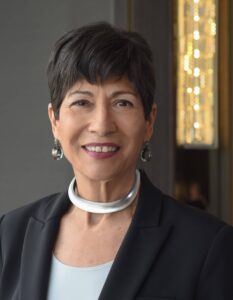 AACTE President and CEO Dr. Lynn M. Gangone recently addressed a cohort of Hunt Kean Leadership Fellows during a policy discussion titled, “Setting the Stage: Educator Workforce Policy and Practice.” The discussion was part of the second in-person session for the Cohort 9 Fellows. Gangone was joined by Dr. Melody Schopp, former chief state school officer of South Dakota, in examining how the teaching profession has changed over time, the advocacy and political influence of educators, and major issues facing the workforce.
AACTE President and CEO Dr. Lynn M. Gangone recently addressed a cohort of Hunt Kean Leadership Fellows during a policy discussion titled, “Setting the Stage: Educator Workforce Policy and Practice.” The discussion was part of the second in-person session for the Cohort 9 Fellows. Gangone was joined by Dr. Melody Schopp, former chief state school officer of South Dakota, in examining how the teaching profession has changed over time, the advocacy and political influence of educators, and major issues facing the workforce.
A program of the Hunt-Kean Institute, the Leadership Fellows program partners with senior-level political leaders to be effective, equity-minded education policymakers at the state level. Named for two former renowned education governors, Jim Hunt (D-NC) and Tom Kean (R-NJ), the national, nonpartisan Fellowship launched in the fall of 2014. The current group of high-ranking elected state officials that make up Cohort 9 have committed themselves to a nine-month immersion in the full education continuum.
During the moderated session, Gangone shed light on the developments AACTE members are undertaking to address the needs of the educator workforce, sharing three specific examples: 1) embracing competency-based education at the undergraduate level, 2) offering higher education-based alternative certifications and 3) debunking the one teacher-one classroom model as addressed by AACTE member-institution Mary Lou Fulton Teachers College at Arizona State University.
14 Aug2023
By AACTE

To honor the outstanding efforts and contributions in this vital field, AACTE proudly presents the AACTE Awards Program, which acknowledges both member institutions and individuals who have made significant strides in the realm of educator preparation.
AACTE is thrilled to recognize and celebrate excellence in education and educator preparation. Check out last year’s AACTE Awardees and read about their 2023 winning entries. If you are an educator, a program administrator, a researcher, or a passionate advocate for education, we invite you to nominate yourself, your institution, or your colleague for a 2024 AACTE Award:
10 Aug2023
By Kaitlyn Brennan
The “In the States” feature by Kaitlyn Brennan is a weekly update to keep members informed on state-level activities impacting the education and educator preparation community.
Earlier this year, Florida’s Republican-controlled legislature enacted measures to expand education transparency laws in the state. The new regulations involve stricter oversight of potentially explicit or sexually related content in books and/or any such text that could be considered “harmful to minors.” Under the law, FL HB1069, such texts are required to be removed from shelves within five days and remain inaccessible to students. The actions are part of a broader effort led by Florida Governor and Republican presidential candidate Ron DeSantis to exert greater control over the curriculum in schools.
However, as many expected, the law has sweeping ramifications for local school districts — including a possible financial hit. To comply with the law, an individual with a valid educational media credential must inventory classroom libraries. For one Florida county that means 10 certified media specialists are working through 98 schools with over 6,000 libraries. The time and personnel required to inventory all libraries has led many districts to contract with third party vendors to complete the process — the services are reported to cost anywhere from $34,000 to $135,000 annually. While outside vendors are certainly profiting from the work, a top executive noted that their company grappled with the decision to offer their services, expressing that working with Florida to implement the new law “tested our company’s culture like nothing before.” The company maintains that students should have access to books “that provide windows to the experiences of others and mirrors to their own experience, including the stories of members of the LGBTQ community, indigenous people, and people of color.”
10 Aug2023
By University of Hawaiʻi News
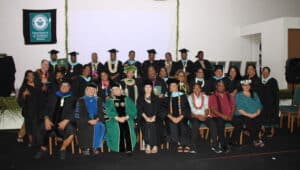
PACMED’s third graduating cohort from the Republic of Marshall Islands (Photo credit: Wilmer Joel/Marshall Islands Journal)
Twenty-four students from the Republic of Marshall Islands (RMI) earned their master’s in education this summer through the PACMED (Pacific Master in Education) program in the College of Education at the University of Hawaiʻi at Mānoa. The new graduates are the third cohort from the RMI since 2017. PACMED supports Pacific Island educators in solving problems by providing a place-based, culturally responsive curriculum in STEAM (science, technology, engineering, arts and math).
PACMED Director Deborah Zuercher, PACMED Operations Director Ivy Yeung, instructors and UH Mānoa Vice Provost for Academic Excellence Laura Lyons attended the graduation ceremony on July 29 at the University of South Pacific.
“Like the coconut tree, this third PACMED RMI cohort swayed in strong winds but was not broken,” said Zuercher. “They endured the strong winds of Covid, online teaching and learning, medical emergencies, health challenges and the loss of beloved family members.”
09 Aug2023
By Weade James
AACTE is proud to introduce three Holmes Scholars who have been selected by the Journal of Teacher Education (JTE) editorial team for a mentoring opportunity. The selected scholars will co-author an editorial or manuscript that will appear in one of JTE’s special anniversary issues in 2024. Through JTE, AACTE is committed to ensuring that the next generation of education scholars, particularly underrepresented scholars, are supported as they advance their research and scholarship.













 AACTE President and CEO Dr. Lynn M. Gangone recently addressed a cohort of Hunt Kean Leadership Fellows during a policy discussion titled, “Setting the Stage: Educator Workforce Policy and Practice.” The discussion was part of the second in-person session for the Cohort 9 Fellows. Gangone was joined by Dr. Melody Schopp, former chief state school officer of South Dakota, in examining how the teaching profession has changed over time, the advocacy and political influence of educators, and major issues facing the workforce.
AACTE President and CEO Dr. Lynn M. Gangone recently addressed a cohort of Hunt Kean Leadership Fellows during a policy discussion titled, “Setting the Stage: Educator Workforce Policy and Practice.” The discussion was part of the second in-person session for the Cohort 9 Fellows. Gangone was joined by Dr. Melody Schopp, former chief state school officer of South Dakota, in examining how the teaching profession has changed over time, the advocacy and political influence of educators, and major issues facing the workforce.